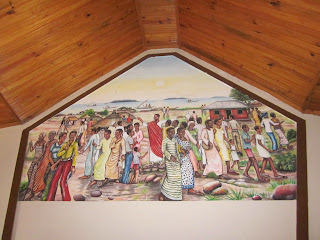A
bubble of spit dribbles down Jesus’ chin and soaks into his already damp bib as
he struggles to fit his hand around the large rock I hold in mine. His right
hand opens and closes in frustration, mimicking the motion his left hand
refuses to make.
It’s
the biggest rock he’s ever tried to pick up during our exercises and although
he’s struggling, I know he can do it.
The
soft-ball size stone is actually a chunk of brick made of dirt and sand that’s
fallen off the knee high wall of an unfinished house where Jesus sits.
So
really, it’s not as heavy as it looks.
The
challenge is for Jesus to use his hand correctly.
We’ve
only been using small stones for this exercise and he’s figured out a way to
pick them up only using his fingers. He avoids using his thumb by pressing it
into his palm.
His
clever method technically gets the job done but he’s not gaining much in
terms of motor skills.
He
does get points for critical thinking.
I
smile when he realizes the chunk of brick renders his four-fingered move
useless.
He
looks up and me and shakes his head, No.
“Yes,
you can.”
No, he shakes his head again, smiling.
“Yes.”
He
lowers his head and stares intently at his left hand. It shakes as he forces it
open, his thumb jerking as it slowly begins to stretch. He places his thumb on
the brick first and then wraps his fingers around it. His fingertips turn white
under the pressure of his grip and he gradually lifts the rock out of my hand.
The rock hovers in the air for a few seconds before it slips out of his grasp
and thuds in the sand at our feet.
“See.”
I say.
He
raises his arms into the air, laughs and nods his head, Yea!
I
pick him up off the recently built wall and sit him down on a nearby boulder to
replace his shoe which I took off for his foot exercise.
The
small community on the sandy hillside above Cambio Puente has changed a lot
over the past months. Many families are in the middle of replacing their bamboo
and estera houses with brick and mortar, and after seeing the aftermath
of the fire in Chimbote
Jesus
has changed a lot too. His hair is cut short and he’s gotten taller, making him
look more like a young boy than a wild, long-haired toddler.
And
he’s more curious now than ever.
I
shake the sand out of his shoe before slipping it back onto his foot. It isn’t
long after I start tying his shoe that he’s trying to grab the laces from my
hands. He points to the laces then puts his hands on his chest, I want to do
it.
“Okay,
here you go,” I say as I hand them over.
After
four or five tries and a few demonstrations, he’s able to get the “over-under”
part down. I hear footsteps crunching in the sand nearby and look up to see his
aunt walking by, smiling and shaking her head at what I’m showing Jesus. Now
that this part of Cambio Puente is developing, some of Jesus’ extended family
has moved to the area, meaning that I never find him home alone anymore.
I
congratulate him for doing so well on his first try and quickly finish the job.
You’d
think I was Harry Houdini the way he stares wide-eyed at my hands. He smiles
and nods, That was cool.
In
that moment, I realize how fortunate I am and also how much I take for granted.
I’ve never realized how meaningful a simple act like being able to tie your own
shoes can be. How much independence it gives you.
For
his last exercise we sit on the boulder, side by side, and I begin to peel a
mandarin. He gets excited and starts to reach for the fruit.
“Hey…”
I say blocking his greedy hands with my elbow, and he quickly arranges his legs
and puts his hands on his lap.
I
hand him the first slice which he tries to grab with his right hand.
“Not
that hand, Jesus. You already know.”
He
smiles sheepishly knowing he wouldn’t get away with it. He carefully takes the
slice in his left hand but drops it into the sand. The second and third slices
follow suit.
“We’re
not going to eat any of it.” I say and we both laugh.
His
laughter is quickly replaced by a look of determination.
The
fourth slice passes from his left hand, to his right and then into his mouth.
Juice
squirts onto my arm as he chews. He laughs. Juice, spit and what looks like
bits of his oatmeal breakfast run down my arm.
Without
thinking, I wipe it onto his pant leg.
As
he sits, happily eating another slice, I struggle with the fact that I wiped
the juice onto his pants and not my own. The image of my sweaty Saturday
morning of washing clothes flashes through my mind.
Still,
I feel angry at myself, and more than a little guilty. I don’t know why. I know
it isn’t that big of a deal. It’s just…moments like these make me realize what
a long way I’ve got to go.
Later,
before I realize what he’s doing, he hugs my knee. His soggy, oatmeal covered
bib leaves a large slimy patch on my jeans.
I
have to laugh.
I
walk him back to his house where his aunt and younger sister sit de-kernelling
dried corn. I look back once as I make my way down the hill to catch a car
headed for Chimbote
Kyle Seymour, Incarnate Word Missionary
Chimbote, Peru















